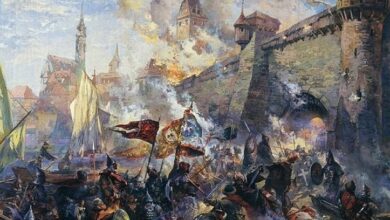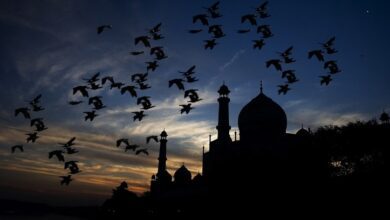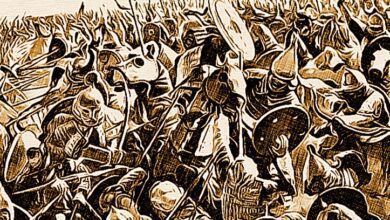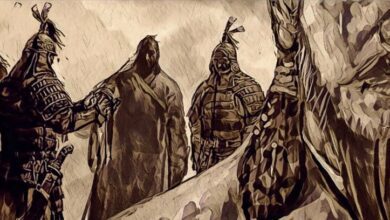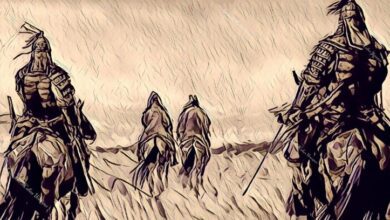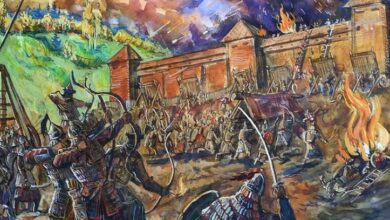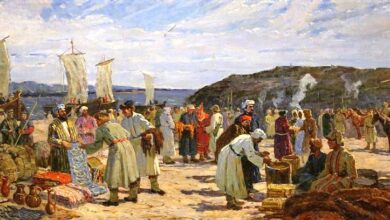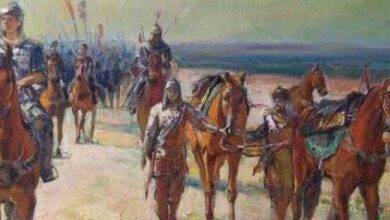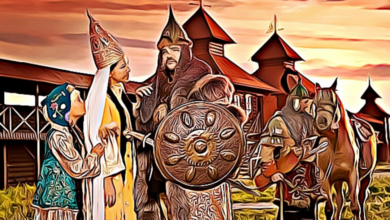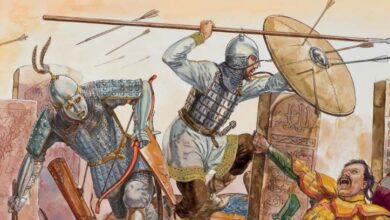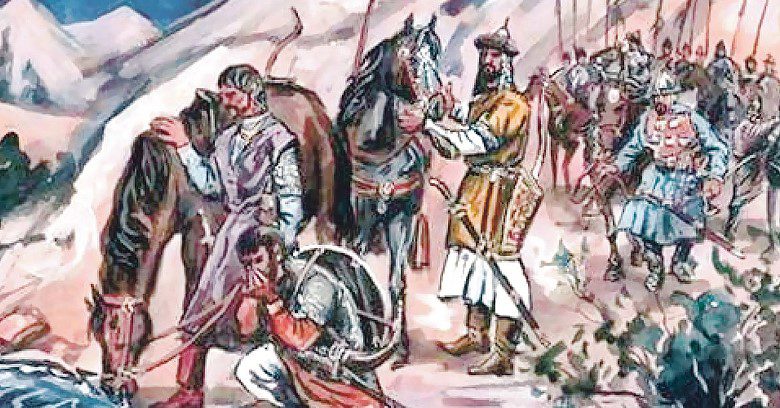
Bu-Yurgan kitabs. Chapter 3. The War of the Four Bahadirs
AND now I’ll tell you about the termination of the robberies of another gang - the Galidjians or the Ushkuyns ... In 1278, Khan Mankai ordered the Galidjians to seize the northern lands of Bulgar in exchange for tripling the Kypchak tribute. Then the Galidjians, taking advantage of the grave disasters that befell our State, as well as the resettlement of 500 thousand Ulchis from other Russian lands to Galidj, captured the western part of the Biysu province and erected their prisons there. Relying on these robber nests, the Galidjians began to break into other areas of the Bulgar North. In order to better counter enemy seizures, Emir Galimbek had to form a new province from the southern lands of Biysu-Nukrat with a center in Kolyn-Kala. Ulugbek power in its western part - with Kolyn himself - was handed over by the emir to the descendants of Sadyk and his Bulgarian Ulchis, otherwise Mankai would have forced the State to transfer Nukrat to the Russians by force. The Galijians complained to the khan about this, claiming that the emir had cheated him. However, when the Khan’s Christian ambassador traveled to Kolyn, the city greeted him with bell ringing and bread and salt, the son of Sadyk Ar-Buga, a venerable white-bearded old man with a cross around his neck, who bravely lied to the Tatar’s face about his complete independence from the Bulgars. The Galidjian informers were accused of lying and executed to the pleasure of Ar-Buga, for they were his personal enemies and in 1278 they recaptured from him Juketun, which was annexed to the State in 1237. True, the ambassador imposed tribute on Kolyn, as if on a separate possession, but it was not very great and burdensome for the Nukrats, because the emir reduced Kolyn's tribute to Bulgar by its size. In fact, the Tyure of Kolyn continued to obey the Bulgar Ulugbek Nukrat, who was sitting in Ar-Balik, but were appointed by the emirs themselves...
226
The offended Galidjians did not stop their robberies, but in the event of the capture of their people, they always denied their involvement in them. And after the death of Uzbek, they began to unite for robberies already in large gangs, because their prey - furs, began to be greatly valued by dandies and almantsy, and after a series of disasters, there were many people ruined and ready for anything. These bands were called ears. Some said that this word was formed from the words “uch kaek” (“three boats”), because they attacked on ships that could accommodate people in three Bulgarian boats. The Nukrat Ulchis, who also called themselves "budishlar" (Vyatchane), turned "uch kaek" into a more convenient "ushkuy", and all of ours, in the end, began to call the robbers in Nukrat. Others argued that this word comes either from the name of the first prey of the Galidjians - three sheep, or from the name of the district "Uch Kui> | on the Upper Chulman - not far from the place of its turn to the south. This district was captured by the Galidjians in 1359, after which they fortified it with ten prisons and turned it into the main robber nest. Here they built their ships, on which they then embarked on their predatory raids. They say that about 50 thousand Galidjians lived there constantly, and this number did not decrease, because more and more people fled there from Galidzh. They had their own leaders, whom they jointly elected at their gatherings, and these leaders did not obey Galidzh and contacted him only in case of exchanging booty for bread, salt, clothes, iron, weapons and jewelry ... It was not possible to drive out the robbers from this district. In the best case, ours, having reached there with incredible difficulty, burned the prisons left by the earmen and then returned, because it was impossible for the State to place and supply large alai in such a remote area. Small ones were easily destroyed by robbers who came out of dense thickets after the departure of a large army.
The same Abram Vasyl, who, in his youth at the Koran, swore to Asyl not to rob again, led the ushkuyniki. But soon Asyl died along with his eldest son while repulsing the raid of the new Nogais of Murza-Timur on Dzhuketau, and the robber felt free from his promise. Then the case was headed by his son - also Vasyl, who in his raids had the weakness not to attack the city of his name - Vasyl-Balik. Vasyl's son Anbal was the last famous leader of the Ushkuins...
227
The raids of the robbers were so sensitive that the emirs entrusted the fight against them to the Cossacks of the beks Garaf and his son Burtas, as well as the salchis of the Kudash fleet and his son Subash. Therefore, this war was called the "Wars of the Four Bahadirs". The center of this war was the Great Bolgar, which the Cossacks called simply "Yort". After the inhabitants moved out of it, only representatives of several trading houses, members of the El-Khum brotherhood, owners of local taverns and caravanserais, and Kypchak tamgachis in Sainov Dvor remained under the protection of the city alay. But there were still a lot of people in the city, because ours stopped on the way to Cheremshan or from Cheremshin to Simbir, horse traders on the way to Kazan and Chally through Laish and slave merchants. The war gave the latter abundant goods. Jabrayil and the heirs of the bakhadirs told me something about some of her events, and I will relay their story. As for the truth, only Allah alone knows it ...
After the memorable defeat of Dzhuketau by Abram bek Alyp - the son of Asyl - went to Uch Kui in winter and burned the robber prisons, but when he left this district, the ushkuyns returned to the ashes and revived their dwellings. True, about 15 thousand of them died from cold and hunger during forced imprisonment in the thickets, but by the summer there were even more of them ...
In 1366, the ushkuiniki on 200 ships went to Agidel, but the Kudashevites blocked the river at *\ashan and forced the robbers to sail to Tash-Kerman. From here, Kudash himself attacked them. Part of the ushkuins, pressed to the shore, landed on it and were killed by Garaf. * Having lost 500 ships, the ushkuins went up the Kara-Idel ...
In 1369, the robbers sailed to the Great Bolgar on 10 ships. Kudash sank three ships, and the rest of the ushkuins landed on the shore with the intention of waiting out the danger. However, Garaf was again on the alert and sent them to hell along with their leader Abram.
Irritated Galidjians the next year twice approached the Great Bolgar on 20 and 30 ships, but both times they were repulsed and lost 25 ships and a thousand people ...
In 1374, one detachment of Galidjians on 70 ships robbed several Russian cities and sold the prisoners in Kazan, and another robbed Kolyn and went to the Great Bolgar on 20 ships taken there. Kudash was then near Kazan, fearing an attack on the city, but after the end of peaceful trade, he received an order from the emir to let the robbers through at their request to Saray. Garaf was also not in the Great Bolgar - having received news of the movement of the Galidjians from Nukrat, he stood in Kashan to defend the city, but the robbers
imperceptibly slipped past him at night to Yort. Here both detachments of robbers met and decided to storm the holy city. Alay of 300 Cossacks prepared to defend himself, but the timid Tatar, Turkmen and Persian merchants preferred to collect money and pay off the Galidjians.
Meanwhile, Kudash, who did not trust the robbers and was moving behind them just in case, also swam up to the Great Bolgar. Having learned what was the matter, he decided to attack the Galidjians, although he had only 35 ships with 700 ship chirmysh-salchis ... The leader of the robbers was someone named Dzhilki, who in 1360 with half of the ushkuins went from Dzhuketau to try new luck in Kolyn and was there he was defeated and captured by a descendant of Ar-Boogie tyure Djilki. Djilki pardoned the robber, and in gratitude he took the name Tyure and took Alyp to Uch Kui. After that, the path to the den of robbers on Chulman was ordered for Dzhilki’s earman, and he went to Galidj and recruited his own gang there ...
Having guessed Kudash's intention, Djilki left 40 ships to cover his withdrawal, and with the rest he headed for Saray. Along the way, he robbed, killed and captured many of our merchants, and in Sarai began to exchange what he had captured for wine and jewelry. After a profitable trade, the Galidjians, as usual, got drunk and fell asleep on one of the Idel islands, and the black Nogais quietly crept up to them and easily killed everyone to the last ...
The robbers who remained at the Great Bolgar began to fight desperately with Kudash, and 20. their ships managed to break through and go up the Kara-Idel. The rest of the ships were either sunk or landed on the shore, where the local alai, with the help of Garaf who came to the rescue, captured the landed without a big fight. Ours exchanged the captured for their merchants, sold by the Galidjians to the Tatars ...
In 1378, the Ushkuyns attacked Kolyn, but were utterly defeated by Djilki's son Anbal. Abram's son Vasyl, who was captured, promised to pay tribute to the State through Kolyn and name his son after Tyure if his life was spared. The Anbal took pity on the robber and let him go, but when in 1379 he approached Uch Kui for tribute, he was treacherously killed by the earmen. At the same time, the Galidjians with the Dzhuketuns, among 10 thousand people, attacked Kolyn, deprived of the best defenders. They managed to capture here 120 ships prepared for the Kudash fleet's raid on Saray and break through on them and on the newly downed rafts to Agidel. Here they divided into two detachments, one of which attacked Dzhuketau, and the other - Kashan. Most of the Cheremshan Cossacks were then with Garaf, who was sent to punish the Ushkuiniks, and 220 Dzhuketun and 180 Kashan Cossacks could not hold back the robbers. The Galidjians broke into i^a cities and subjected them to destruction. In the midst of it, the robbers set fire to the urams in order to smoke out the alai from the echke-kalga that interfered with them. The Cossacks, in order not to burn out, were forced to leave Dzhuketau and Kashan. At that moment, Kudash sailed from Tash-Kerman with 30 ships and, dividing his ships into two detachments, bravely attacked the robbers. In this battle, the Salchis lost Kudash and 22 ships, but defeated the ships of the Galijians. Only 500 robbers managed to escape, the rest, left without ships, were killed by the Bashkorts and Yarchallyns of the son of Challa-Mohammed Khusain and the Kashan Ak-Chirmysh and Subash who arrived in time for Dzhuketau. Garaf burned the Uchkuy prisons and returned. This victory glorified Husain and deservedly so. Having finished with the robbers in Dzhuketau, the bek rushed to Kasha-nu and helped to quickly finish the job there. From that time on, the sun of Ashrafid's destiny began to rise high...
228
229
The best forces of the robbers died, but there was still a large crowd who wanted easy money. In 1391, the Galidjians and Ushkuyns again attacked Kolyn, led by Vasyl. The son of Anbal Tyure Ardzhan fought desperately for the balik and defeated the murderer of his father Vasyl, but was forced, in the end, to retreat. The son of Mahmud-Sultan, Khan Bek-Daud, who received the city and district of Dzhu-ri together with his father, went with 3 thousand Arsk ak-chirmysh and Cossacks to Nuk-rat and threw the robbers out. At the same time, up to 5 thousand Galijians and Ushkuyniks fell. He remained here as an Ulugbek with a thousand Cossacks, but two years later, Vasyl's son Anbal with the Galidjians again attacked Kolyn and captured Bek-Daud with 200 Cossacks. Mahmud-Sultan went to rescue his son, and after a fierce attack near the city, in which ours put 1200 infidels, he forced Anbal to negotiate. They ended with the good khan allowing the robbers to leave unhindered in exchange for his son and his Cossacks...
In 1409, Anbal with 8,000 ushkuins sailed into Agidel from the east, and 5,000 Galidjians, who agreed with him, sailed from Jun-Kala. When Anbal saw 80 ships of Kudash's son Suba-sha, he ordered his people to go ashore at Yar Chall, and then, under the guise of a sortie, got out of the robber camp and surrendered to Alai's grandson, Gali-Dzhura's son Enikey and Subash. The Ushkuiniki were in great confusion, and when Subash pulled out cannons from the ships and fired several volleys at the robber camp, they surrendered in horror. Having handed over the prisoners to Burtas who came to the rescue, Subash swam swiftly towards the Galidjians. They managed to burn Seberche, but at Chybyk-sar and Bish-Balta they didn’t profit from anything and sailed to the confluence of Kara-Idel with Agidel at the same time as Subash. Salchibashi sent a third of the Galidjians to the bottom, and the rest in a panic swam to Rus'. At Seberche they were ambushed by the son of Mardzhan Malmysh and the whole crowd went to hell.
Anbal converted to Islam and entered the service of the State. Burtas went with him to Uch Kuy in winter and burned all the prisons there. About thirty thousand people remained there, and they all fled from their homes and died in the forest thickets. The next year, the sardar again went to Uch Kuy, but saw a lifeless ashes. The robbers' nest was finished, and the Galidjians, having lost their best warriors, also subdued ...

